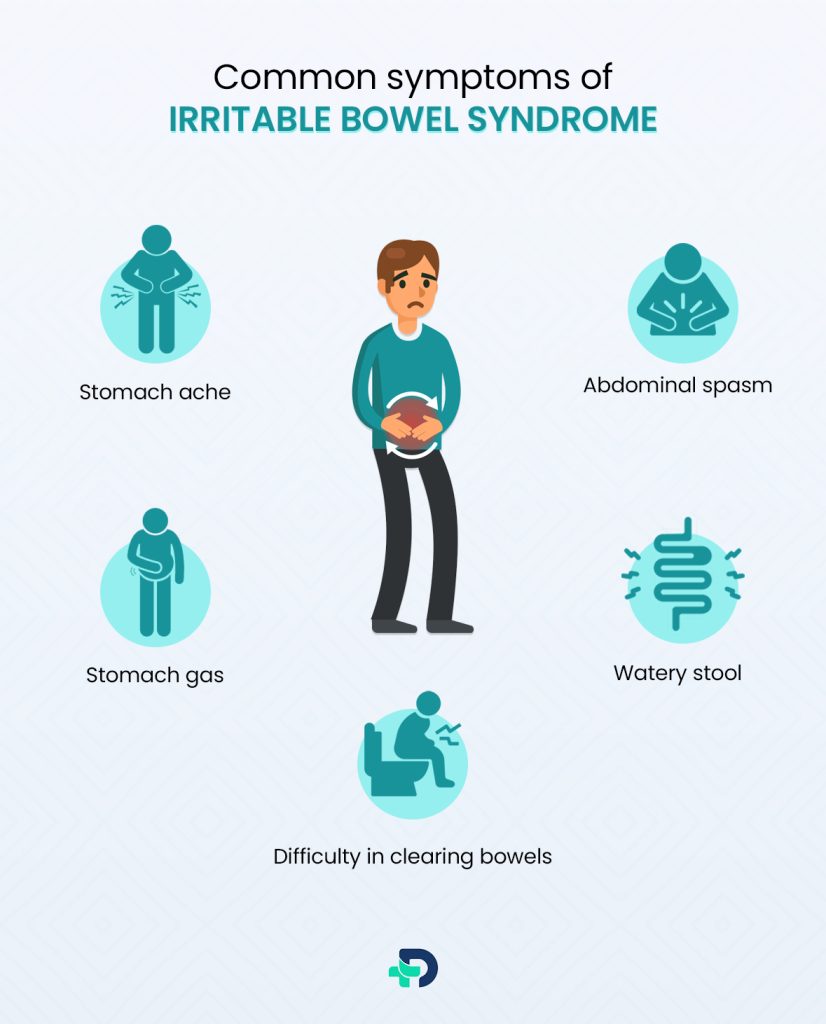Is IBS A Disability? Everything You Need To Know About IBS

- Irritable Bowel Syndrome
- 06 Oct 2023
Overview
Irritable Bowel Syndrome
IBS (irritable bowel syndrome) can notably interrupt an individual’s life. IBS is an agonizing gastrointestinal disorder with a cluster of symptoms that affects the gut. Suppose disease symptoms prohibit an individual from engaging in usual work, getting around in social functions, doing a regular job. In that case, specific associations might regard it as a disability. Some organization, viz; the Social Security Administration, does not regard IBD as a disability. Yet, if an individual with severe IBS hampers his daily activities, the organisation might consider it a disability and provide benefits 1 Overview | Researched based study from National Institutes of Health.

The article will show whether IBS is a disability, IBS symptoms, treatment, diet, and some assistance that IBS patients can avail of. Moreover, it will also elucidate specific queries that one should know about IBS.
Disability
Is IBS a Disability?
- The CDC (Center for disease control and prevention) considers any disease as a disability only when an individual finds difficulty in carrying out regular day-to-day activities and mingling in society.
- So rigorous IBS is a disability and the individual suffers from diarrhea and extreme abdominal aches. Moreover, it hampers them from doing regular jobs or socializing 2 Disability | Researched based study from National Institutes of Health .
Rating
IBS Disability Rating
IBS is a condition that impacts the bowels. It causes abdominal discomfort, constipation, diarrhea, and bloating. It is one of the most frequent digestive issues found in most people worldwide.
The United States professionals receive a rating for IBS depending on the IBS severity.
The rating for IBS severity is listed below-
- Rating of 0% – The individual with IBS has mild symptoms with little stomach pain and difficulty clearing the bowels.
- Rating of 10% – The individual has moderate IBS with recurrent stomach discomfort and bowel irregularity.
- Rating of 30% – The individual has severe IBS, frequent stomach pain, and interchanging constipation or diarrhea 3 Disability Rating | Researched based study from United States Department of Veterans Affairs .
Symptoms

IBS Symptoms
The common symptoms of IBS are listed below-
- Stomach ache
- Abdominal spasm
- Stomach gas (bloating)
- Difficulty in clearing bowels
- Watery stool (diarrhea)
People with IBS often get both diarrhea and constipation. The individual find relief from the stomach gas after a bowel movement.
The symptoms might vary from person to person. Some might not get continual symptoms, while others might get. However, in some individuals the symptoms might come and go 4 Symptoms | Researched based study from National Institutes of Health .
Treatment
IBS Treatment
To date IBS has no cure. The treatment only manages the IBS symptoms and further prevents it from occurring.
The health professional initially suggests lifestyle modification and home treatment before offering medications 5 Treatment | Researched based study from National Institutes of Health .
Some of the home treatments or lifestyle changes for IBS are as follows-
- Regular exercise and walking
- Avoiding stress by doing yoga and meditation
- Limiting caffeinated drinks
- Consuming fiber supplements
- Regular intake of probiotic (beneficial bacteria) foods viz, yogurt, kefir to relieve stomach gas
- Cessation of smoking as IBS is more common in smokers 6 Treatment | Researched based study from National Institutes of Health .
Medications for IBS
If the individual is not relieved from lifestyle changes and home remedies, the physician might prescribe certain medications to manage the condition.
Some commonly prescribed medications for IBS are as follows-
- Antidepressant medication
- Anti-spasmodic medications
- Medicines for bowel regularity 7 Medicines | Researched based study from American College of Gastroenterology .
Diet
Food to Eat for IBS
Physicians generally advise people with IBS to consume food with low FODMAP (fermentable, oligosaccharide, disaccharides, monosaccharides, polyol).
FODMAP are small carbohydrates the gut cannot absorb appropriately so several people feel abdominal discomfort from eating FODMAP food.
List of foods that IBS people can eat
- Lean meat
- Egg
- Pumpkin
- Eggplant
- Peas
- Carrot
- Kiwi
- Grapes
- Oranges
- Strawberries
- Raspberries
- Oatmeal
List of food that IBS people must avoid
- Brussel sprouts
- Broccoli
- Asparagus
- Onions
- Beans
- Lentils
- Chickpeas
- Kidney beans
- Watermelon
- Mango
- Apple
- Pear
- Plums
- Peaches
- Coffee
- Alcohol
- Nuts
- Wheat products viz; bread, cereal, pasta
- Milk products
- Foods containing xylitol, sorbitol 11 IBS Diet| Researched based study from National Institutes of Health .
Living With
Living With IBS
Most individual’s life becomes most challenging to live with IBS. However, one can take support from specific resources to achieve a good life quality. One can speak to the doctor for locally available support groups or contact some of the online support groups listed below-
- The IBS networks
- IBS patient Support group
- Senior Lifestyle support group
- Bezzy IBD community
To make the everyday life more convenient, people can even contact support organizations for “I can’t wait” card. The card indicates to other people that the individual needs to use the toilet immediately for medical issues without standing in the queue. However, most organizations provide the card only to inflammatory bowel disease patients rather than IBS patients. So, IBS individuals can speak to a physician to get one.
Criteria for disability according to SSA (Social Security Administration) organization
Social Security Administration (SSA) is an association that provides monetary assistance to individuals with disabilities.
The gut disorders that SSA regards as disabilities are listed below:
- Malnutrition
- Inflammatory bowel disease
- Liver dysfunction
- Short bowel syndrome
- Gastrointestinal hemorrhage
The SSA does not include IBS in the list of disabilities. Regardless, an individual can still avail the SSA benefits if they can validate that their condition is hampering their daily activities by showing valid documents, viz; inability to perform physical activities.
ADA (Americans with Disabilities Act) criteria for people with disabilities:
- ADA provides accommodation assistance to people with disabilities. According to the ADA, disability is any mental or physical condition that limits one in performing daily activities. People with any disability get protection under ADA.
- Individual discrimination based on disability is purely unlawful under the ADA.
- The ADA also provide equivalent right to individuals with disabilities in several circumstances viz; government services, public spaces, telecommunication and transportation 16 Living with IBS | Researched based study from National Institutes of Health.
FAQs
Frequently Asked Question About IBS
Q. Is IBS dangerous?
- IBS is a frequent problem that impacts 15% of the world’s population. Most people who get severe IBS symptoms require medical help 8 FAQs | Researched based study from National Institutes of Health.
- A research study in the IBS population has found that people with IBS have a lower fatality risk 9 FAQs | Researched based study from National Institutes of Health . Another 12-year study on IBS has shown that IBS patients do not have a higher cancer probability than the average population that does not have IBS 10 FAQs | Researched based study from National Institutes of Health .
Q. Is IBS a disease or disorder?
- IBS is a disorder caused by improper brain and digestive tract communication.
- The disease condition ranges from mild to moderate to rigorous. However, IBS is not a gut disease and seldom causes massive bodily injury 12 FAQs | Researched based study from Nature Portfolio .
Q. How severe is IBS?
- Only very few people experience severe IBS symptoms. Most people can manage the symptoms with lifestyle changes, proper diet, and minimizing tension. However, for severe IBS symptoms doctors can very fine handle the IBS symptoms with drugs and psychotherapy (counseling).
- Moreover, IBS does not enhance the probability of colorectal cancer nor cause any alteration of the colon tissue.
- Yet, people living with IBS have a low quality of life with the person’s home confinement and inability to engage in social functions and daily activities effectively. It could eventually lead to anxiety and depression in the individual and ruin personal relationships 13 FAQs | Researched based study from National Institutes of Health.
Q. Is IBS a lifetime disease?
- IBS is a persistent gut condition that might continue throughout one’s life. However, the IBS symptoms might differ at different times and from person to person. With the correct strategy doctors can manage the IBS well.
Q. What age does IBS start?
- Individuals can get IBS at any age. Some people might begin having the symptoms at younger age while others might experience before 40. Most IBS patients have a familial IBS history.
Q. Does IBS get worse with age?
- IBS does not cause stern illness like irritable bowel diseases. However, IBS can cause deteriorating symptoms in older adults but also might show lesser signs. Moreover, IBS might impact a person’s quality of life.
Q. Does anyone recover from IBS?
- Although IBS has no cure, proper, accurate treatments can handle the symptoms well.
- The potential therapies include diet alteration, lifestyle changes, drugs, and fiber supplements.
Q. Can stress cause IBS?
- The central nervous system has two segments, viz., the parasympathetic and the sympathetic nervous system. The parasympathetic nervous system controls excretion, urination, tear, and saliva secretion.
- In contrast, the sympathetic nervous system gets stimulated with tension and worry and releases hormones that increase the heartbeat and blood flow to muscles and inhibit the stomach’s digestion process. Both segments of the nervous system work in a continuous cycle.
- As we all know, tension is the body’s response to specific threats. In standard cases, when the threat disappears, the body releases the stress to return to normal. Yet, in an extended period of anxiety and stress; the body cannot restore the normal body state. Consequently, the gut becomes hyperactive or abnormally inactive, which can confer to the IBS symptoms.
- Research studies have found that the digestive tract also sends indications to the brain that might impact digestion based on the emotional state 14 FAQs | Researched based study from National Institutes of Health .
- Moreover, studies have also indicated that the gut’s beneficial bacteria send messages to the stomach and the brain that help proper digestion 15 FAQs | Researched based study from National Institutes of Health .
Takeaway
IBS – Make Modifications to Your Lifestyle
- IBS is an intolerable persistent condition that primarily impacts the mental situation and life quality if not correctly managed.
- The symptoms of IBS are pretty irritating with repeated stomach gas, abdominal pain, constipation and diarrhea.
- IBS has no cure but one can handle the symptoms quite well by adopting specific lifestyle changes and diet modification.
- Individuals living with IBS can speak to health professionals for support groups to better their quality of life.
Any feedback on this article?
 This Articles content was accurate
This Articles content was accurate Very Informative Article
Very Informative Article I have a question or a comment
I have a question or a comment
 This article contains inaccurate content
This article contains inaccurate content This article was not helpful
This article was not helpful I have a question or a comment
I have a question or a comment
We appreciate your helpful feedback!
Checkout our social pages
References
-
National Institutes of Health
Overview
-
National Institutes of Health
Disability
-
United States Department of Veterans Affairs
Disability Rating
-
National Institutes of Health
Symptoms
-
National Institutes of Health
Treatment
-
National Institutes of Health
Treatment
-
American College of Gastroenterology
Treatment | Is IBS a disability/medicines
-
National Institutes of Health
FAQs
-
National Institutes of Health
FAQs
-
National Institutes of Health
FAQs
-
National Institutes of Health
IBS Diet
-
Nature Portfolio
FAQs
-
National Institutes of Health
FAQs
-
National Institutes of Health
FAQs
-
National Institutes of Health
FAQs
-
National Institutes of Health
Living with IBS




































